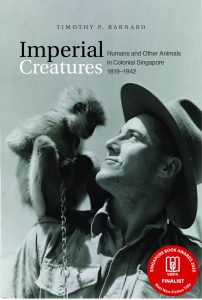Timothy P. Barnard’s Imperial Creatures
August 14, 2020

This Sunday, 16 August 2020, Associate Professor Timothy P. Barnard (NUS Department of History) will be conducting his talk, Imperial Creatures, at 4pm as part of The Arts House’ LumiNation festival. The third edition of the festival centres on the theme of migration in Singapore. Based on his latest book, Imperial Creatures: Humans and Other Animals in Colonial Singapore, 1819–1942, A/P Barnard’s talk will examine how colonial forces manipulated the country’s historic environmental landscape, in turn, shaping today’s society.
A/P Barnard began teaching in NUS 21 years ago. In his time with the university, he has undertaken the study of Singapore’s history from an environmental perspective. His books focus on the environmental destruction Singapore underwent in the 19th century, exploring the influence of nature on the imperial government’s decisions and vice versa.
As mentioned in his interview with ArtsEquator, A/P Barnard sees great merit in using animals to comprehend history by adopting a varied perspective. Making reference to Malay hikayats (epics) and syairs (poetry), he highlights how pre-1819 texts effectively represent history by adopting symbols of nature, whereas post-1819 texts dull in comparison for following a westernised political framework. He encourages a return to the former style of Malay writing which better conveys pertinent lessons to the reader.
Besides his latest book, which has been nominated by Singapore Book Awards 2020 for best non-fiction, A/P Barnard’s related work includes Nature’s Colony: Empire, Nation and Environment in the Singapore Botanic Gardens (2016), “Confrontation on a River: Singapore as a Battleground in 18th Century Malay Historiography” (Early Singapore, 1300s-1819: Evidence in Maps, Text and Artefacts, 2004) and Multiple Centres of Authority: Society, Environment and the Malay State in Siak, 1674-1827 (2003).
Read the full interview with ArtsEquator here.
Find out more about the talk here.
